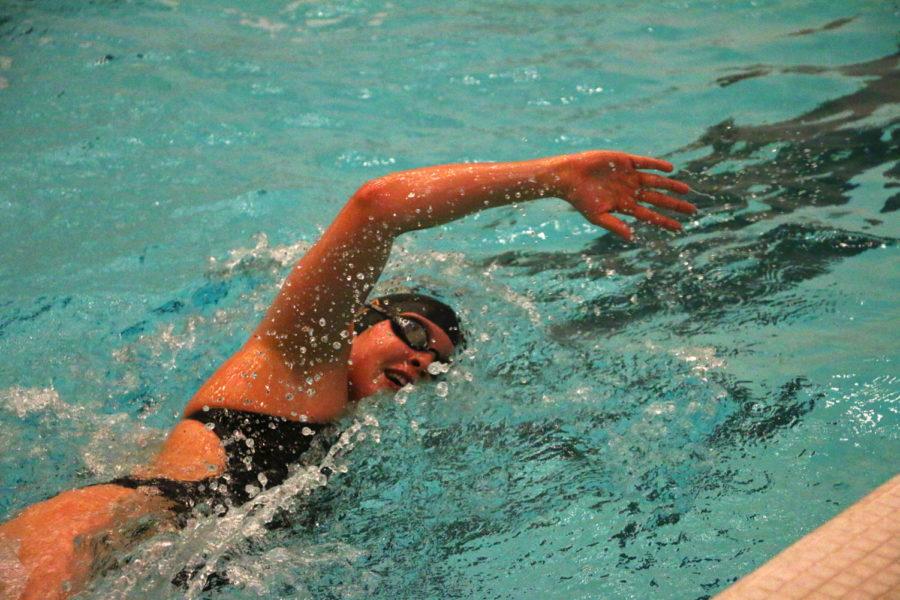Israeli swimmers face military duties, difficulties in coming to Iowa State
October 22, 2015
Imagine growing up with war all around you. Imagine forced military enlistment after high school even if you had your own dreams to catch. Two ISU swimmers had dreams of collegiate swimming, but those dreams were a lot harder than for most.
Shahar Silberman’s hopes for competitive swimming were shelved for two years to serve in the Israeli military.
“It’s a mandatory service, so everyone after high school has to serve. Girls do two years, and boys do three,” Silberman said, “I think it was important, because you know more about what’s going on, and you’re more aware of not just your country but everything around.”
Silberman was known as an excellent athlete while serving in the military due to her time on the Israeli National team, allowing her to practice swimming during enlistment.
All she could say about her duties with the Israeli military was that they comprised of classified office work. Although she never came in direct contact with any of the violence going on in her country personally, she has witnessed it, and she knows people who have been embroiled in it.
“It’s really hard [to come to college right out of high school], it’s like getting a status of [the elite],” Silberman said.
Only one or two people from each sport are allowed by the government to immediately pursue college after graduation, and Silberman said the process was so difficult that she didn’t want to even try.
Those rules didn’t apply to Guy Shilon who has Type 1 diabetes, which led to her exclusion from military service. After she graduated high school, she was allowed to come to the United States to swim and receive an education.
A lot of athletes in Israel know it’s possible to come to America to continue competing in their sport.
Silberman is a senior and influenced Shilon, a freshman, to come to Iowa State. Shilon knew Silberman and had contacted her prior to making her decision to come to Iowa State.
Silberman contacted ISU swimming assistant head coach Kelly Nordell about coming to Iowa State when her time in the military was up. Although Silberman’s service ended in September 2011, she waited a year and started competing in 2012.
“I decided to come here because I wanted to swim and study [simultaneously],” Shilon said. “I started to speak with a few universities, and I felt connected with [Nordell]. I wanted to go to strong team, it’s important for me.”
In Israel, sports and school don’t mix.
“You can’t be in school and swim at the same time. University doesn’t have sports,” Silberman said. “It’s almost impossible, so if you want to continue with your sport, you have to go somewhere else.”
Silberman was an important factor in getting Shilon to campus, but it was the ISU coaching staff that sealed the deal for Silberman’s own arrival.
“I Skyped [Nordell] and [head coach] Duane [Sorenson], and I Skyped the team,” Silberman said. “I felt like it’s a family here, and the connection was really strong. Everyone was so welcoming, I felt like it’s a good team, a good environment.”
International school systems, American school systems and the NCAA are all on different schedules when it comes to getting documentation ready for recruitment.
“After they take all their exams in July, the department of education in Israel shuts down for a two- to three-month break,” Nordell said.
Many documents and papers are due at the end of July for recruitment into the swim program at Iowa State, Nordell said, which makes it difficult if deadlines are missed.
“[Shilon’s] parents were very determined and found the right people in the Department of Education to get the right documents for the NCAA [to clear her to come],” Nordell said.
Even after the documentation process is completed, athletes still have a lot of work to do.
Iowa State has to confirm proper academic work has been completed. The student athlete can be accepted into the university, but the univeristy still needs the NCAA Eligibility Center to approve of her eligibility to compete on the team, Nordell said.
“The international students are so determined, and sometimes they come from varied backgrounds, but the dream of competing in the [United States] … is like a dream come true,” Nordell said. “Once you’re at a certain level, if you’re not the elite in an international country, then you’re basically done. They don’t have the collegiate system in place like we do.”
Despite all the difficulties of getting to Iowa State, both Shilon and Silberman feel they made the correct choice.
“I’m really happy I came here,” said Shilon, who set three personal records in her first meet as a Cyclone against Nebraska. “I don’t like the weather though.”
Even after serving in the military, Silberman found the spark and fire to come to America.
Silberman made the Big 12 Commissioner’s Honor Roll in 2014 and was named Academic All-Big 12 First-Team in 2014-2015. By the end of her junior year, she had recorded six top-five performances and still has one year left to swim.
“I love it here. I’ve made a lot of friends. The sense I had before I came here, about family, I was right about it,” Silberman said. “It is like a family here, and everyone really cares about each other.”







